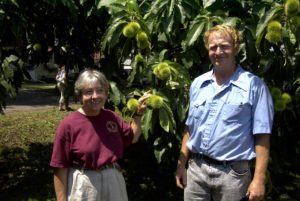Iowa farm damaged by dicamba drift

Kathy Dice and Tom Wahl, owners of Red Fern Farm, with one of their chestnut trees.
Drift from dicamba herbicide damaged chestnut trees grown by an Iowa farmer last fall. Tom Wahl, owner of Red Fern Farm in Wapello, Iowa said drift damage was widespread over 14 acres of chestnut trees. The drift came from a soybean farm that is southwest of his farm about one-quarter of a mile away.
Production was 1000 pounds less than expected
“The drift would have to pass through pasture and a dense forest,” he says.
Wahl saw leaf curling, a visible symptom of dicamba drift damage, on one-third of his trees.
Dicamba is used with new genetically modified soybeans developed by Monsanto. The herbicide is prone to drifting; it turns from a liquid to a gas and can travel for miles damaging “off-target” crops.
Fortunately, Wahl’s chestnut trees didn’t die but they produced much less than he expected.
“I was expecting a significant increase in production to 8000 pounds but it was 1000 pounds less,” he said. “Dicamba had to at least been contributing factor to our reduced yield.”
Wahl was one of many farmers in 25 states reporting damage from dicamba. An estimated 3.6 million acres was affected including soybeans, fruits, vegetables, and trees such as Wahl’s.
Convincing evidence linking dicamba “to health problems along with drift problems”
Several states including Arkansas, Missouri, North Dakota, and Minnesota announced they will place restrictions on the use of dicamba.
Monsanto aims to sell enough dicamba resistant GM soybean seed to cover 40 million acres this year, which is twice as many acres as in 2017.
Wahl thinks dicamba should be banned.
“All phenoxy herbicides (which includes dicamba and 2,4-D) should have been banned when 2,4,5-T (the main herbicide in Agent Orange) was banned. There is very convincing evidence linking them to health problems along with drift problems,” he says.







